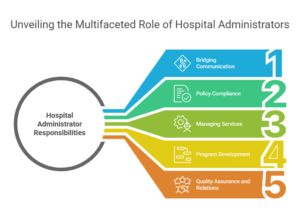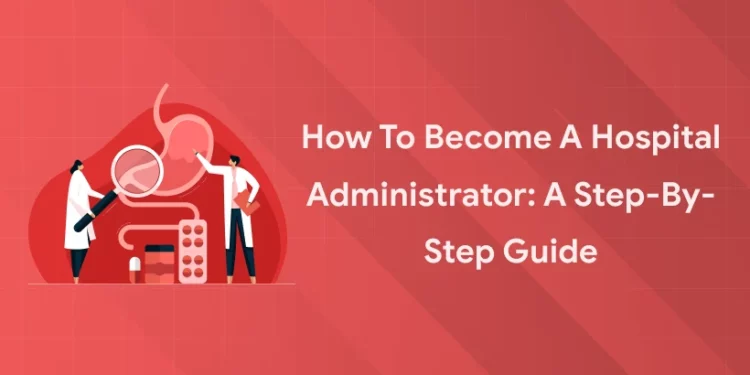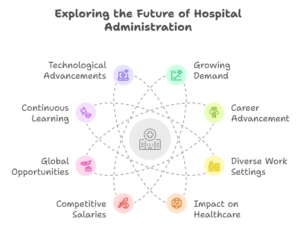Table of Contents
Introduction
Imagine a bustling hospital ward in Kochi where a mother anxiously waits for her child’s surgery results, staff coordinates seamlessly, and resources flow without a hitch. Hospital administrators make this possible, quietly directing operations so caregivers can focus on healing. For many in Kerala and across India, this career blends a passion for helping people with sharp business skills, especially as healthcare expands rapidly.
India’s healthcare sector needs over 2 million more professionals, including administrators, to support initiatives like Ayushman Bharat and rising medical tourism. This guide answers key questions upfront with clear facts, then dives deeper, tailored for career aspirants seeking structured paths in hospital administration courses India, eligibility details, and salary insights.
Join Entri’s Hospital and Healthcare Administrator Course
What is a Hospital Administrator?
1: What is the primary role of a hospital administrator?
Hospital administrators oversee non-clinical operations in hospitals, clinics, diagnostic centers, or nursing homes. They ensure smooth functioning by managing resources, staff, and compliance.
In detail, these professionals handle everything from budgeting and vendor contracts to patient flow optimization and crisis response. Unlike doctors or nurses, they focus on the business side, applying management principles to healthcare settings. Roles exist in public hospitals like AIIMS, private chains like Apollo, or smaller Kerala facilities, making it accessible for local talent. Demand grows with India’s 15% annual healthcare sector expansion.
Hospital Administration Course with Assured Career Growth
Hospital Administration Course by Entri App: Master essential healthcare management skills, gain certification, and secure top roles in leading hospitals
Join Now!What Does a Hospital Administrator Do?
Hospital administrators manage budgeting, staffing schedules, policy implementation, and cross-department coordination. They approve equipment purchases, monitor patient satisfaction, and enforce safety protocols.
Daily tasks include reviewing financial reports, conducting staff meetings, auditing compliance with NABH or JCI standards, and resolving operational bottlenecks like bed shortages. During emergencies, they activate contingency plans and liaise with government health departments. In larger hospitals, they analyze data from EHR systems to cut costs by 10-20%. This role demands balancing empathy for patients with fiscal responsibility.

Career Path and Qualifications
Education and Experience:
- Need a master’s degree or equivalent.
- Can start with a bachelor’s and gain experience before advancing.
Median Pay and Job Outlook:
- Median pay for hospital administrators in India varies but is competitive.
- Job outlook is good due to the increasing demand for healthcare services.
Work Environment:
- Work in hospitals, clinics, and healthcare centers.
- Work hours can be irregular, and staying updated on healthcare trends is important.
How to Become a Hospital Administrator in India: Step-by-Step
Step 1: Education
A Bachelor’s degree in healthcare administration or a related field should be obtained. Basic knowledge will be provided through this degree. Experience should also be gained through internships or entry-level jobs in healthcare to understand how things work.
Step 2: Master’s Degree
Next, a Master’s program in healthcare administration or a related field should be enrolled in. Areas like hospital management or healthcare policy should be focused on. A deeper understanding and higher qualifications will be acquired through this program.
Step 3: Gain Experience
Work in smaller administrative roles within healthcare organizations should be begun. As more experience is gained, more responsibilities and leadership roles should be taken on to build skills.
Step 4: Certifications
Certifications like Certified Healthcare Administrative Professional (CHAP) or Certified Medical Manager (CMM) should be considered. Credentials can be improved through these certifications. Specific courses, such as , which covers important skills and provides practical experience, might also be taken.
Step 5: Network
Industry events should be attended and professional associations related to healthcare administration should be joined. Networking with other professionals can help job opportunities be found and more about the field be learned.
Step 6: Stay Updated
Changes in healthcare regulations and technology should be kept up with by taking additional courses and staying informed about industry news. Continuing education is crucial in this ever-changing field.
Step 7: Leadership Opportunities
Chances to lead projects or teams in the current job should be looked for. Leadership abilities should be demonstrated to help higher positions be moved up to.
Step 8: Career Advancement
Further education like a Doctor of Health Administration (DHA) or a Master of Business Administration (MBA) should be considered for advanced knowledge and leadership skills. A career path should be planned and opportunities for growth should be sought.
Step 9: Adaptability
Changes in healthcare should be adapted to. Flexibility and a willingness to take on new challenges are important traits for a successful hospital administrator.
Step 10: Lifelong Learning
Ongoing learning throughout the career should be committed to. Staying current and continuing to advance in the field of healthcare administration will be helped by this.
Hospital Administration Course with Assured Career Growth
Hospital Administration Course by Entri App: Master essential healthcare management skills, gain certification, and secure top roles in leading hospitals
Join Now!Types of Hospital Administrators (Roles):
| Role | Key Responsibilities | Avg. Salary (₹ Lakhs/Year) | Common Employers in India |
|---|---|---|---|
| CEO/Superintendent | Set long-term goals, board reporting, and expansion planning | 20-50 payscale | Apollo, Fortis, AIIMS |
| COO | Oversee daily ops, supply chain, and efficiency metrics | 15-25 | Manipal, Max Healthcare |
| CMO (Admin Focus) | Coordinate medical staff, protocol approvals, and training | 18-30 | Government hospitals |
| Quality Manager | Lead audits, NABH accreditation, and patient safety programs | 6-12 | Smaller clinics, Kerala hubs |
| Operations Manager | Staff rostering, facility maintenance, and inventory control | 8-15 | Nursing homes, diagnostics |
Executive Leaders:
- Chief Executive Officer (CEO): Leads the hospital, making big decisions and setting goals.
- Chief Operating Officer (COO): Manages day-to-day operations to keep things running smoothly.
- Chief Financial Officer (CFO): Handles money matters like budgets and finances.
Medical Oversight:
- Chief Medical Officer (CMO): Supervises medical staff and ensures quality patient care.
Departmental Managers:
- Administrative Directors: Run different parts of the hospital, like HR or facilities.
- Clinical Administrators: Manage specific medical departments like surgery or emergency services.
Quality Assurance:
- Quality Assurance Managers: Make sure the hospital meets high standards and follows regulations.
Patient Services:
- Patient Services Managers: Help patients with things like admissions and discharge planning.
Information Management:
- Health Information Managers: Handle medical records and data to support patient care.
Salary of a Hospital Administrator in India
Entry-level hospital administrators earn ₹4-8 lakhs per year, mid-level professionals ₹10-18 lakhs, and senior executives ₹20-50 lakhs or more. Salaries vary by city, experience, and qualifications.
Metros like Mumbai or Delhi offer 20-30% higher pay due to cost of living and larger facilities; Kerala averages ₹6-15 lakhs, with Kochi roles at premium for tourism-linked hospitals. Certifications boost earnings by 15-25%, and bonuses tie to performance metrics like occupancy rates. Freshers start at ₹40,000 monthly, rising to ₹1.5 lakhs with 5+ years. Job sites like Naukri report 12% YoY salary growth in 2026.
Skills for Healthcare Administration:
Teams are Led:
Effective healthcare administrators inspire and guide teams to achieve goals. They make decisions aligned with the organization’s mission to create a motivated work environment.
Communication:
Clear communication is crucial in healthcare administration. Ideas are communicated clearly to ensure everyone understands policies and reports. Relationships with different teams are built for successful collaboration.
Organization:
Healthcare administrators excel in organizing tasks and resources efficiently. They manage time, budget, and staffing wisely while paying attention to details for accuracy.
Healthcare Basics:
Administrators understand how healthcare systems and medical procedures work. They use medical terms to communicate effectively with healthcare professionals.
Problem-Solving:
Administrators solve problems by analyzing information and finding effective solutions based on accurate data.
Adapting:
Adapting to changes in healthcare regulations and technologies is important. Administrators adjust strategies to stay compliant and efficient.
Ethical Behavior:
Upholding ethical standards is vital. Administrators follow rules, maintain confidentiality, and prioritize patient welfare.
Tech Skills:
Proficiency in healthcare software and data analysis is necessary. Administrators use technology to manage records securely and make informed decisions.
Customer Service:
Administrators focus on patient satisfaction through compassionate care and good communication with patients and healthcare providers.
Learning:
Continuous learning is key. Administrators stay updated on industry trends and regulations to improve healthcare delivery.
Future Scope of Becoming a Hospital Administrator
Growing Demand
The healthcare sector is being rapidly expanded, with more hospitals and clinics being opened. An aging population is leading to an increased need for healthcare services. Additionally, new technologies are requiring skilled managers to be implemented and overseen. This growing demand is making hospital administration a promising career.
Career Advancement
Many opportunities for career advancement are being offered to hospital administrators. Top positions like CEO or COO can be aimed for. Specialization in areas like health informatics or patient safety can be focused on, allowing specific parts of healthcare management to be targeted.
Diverse Work Settings
Various places beyond just hospitals and clinics are available for hospital administrators to work in. Roles in government agencies are being found, helping public health to be managed. Consulting firms are employing administrators to be advisors on healthcare management practices. This variety is offering a dynamic career path.
Impact on Healthcare
A key role in improving healthcare is being played by hospital administrators. Better care strategies are being implemented, healthcare policies are being shaped, and hospital operations are being enhanced. Patient care and overall healthcare quality are being directly impacted by their work.
Competitive Salaries
Competitive salaries are being offered to hospital administrators, with pay increasing with experience and qualifications. This financial incentive, along with the chance to have a positive impact, is making hospital administration an attractive career choice.
Global Opportunities
Worldwide demand for skills in hospital administration is being created, offering opportunities for international careers. Understanding of global healthcare systems can be gained, leading to work in different countries and contributing to global healthcare improvements.
Continuous Learning
Continuous learning is being required for hospital administrators to stay current with industry changes. Ongoing training and education are being provided, helping them to adapt to new technologies and regulations. This ensures that they remain effective leaders in healthcare management.
Technological Advancements
New technologies like electronic health records and telemedicine are needing to be managed by administrators. Tech-savvy administrators are being demanded because new systems can be effectively implemented and overseen by them.
Healthcare Reforms
Healthcare reforms and new laws must be navigated by administrators. Staying informed about policy changes and ensuring compliance with new regulations is a critical part of their job.
Enhanced Patient Experience
Patient satisfaction is being improved as a key goal for hospital administrators. Streamlined healthcare delivery and a focus on patient-centered care are helping a better experience to be created for patients.
Build Core Skills with Entri’s Hospital Administration Course
Hospital admins require hands-on training in operations, IT, and soft skills. Entri’s Hospital Administration Course in Kerala delivers an 8-month certification program in partnership with CEED, NSDC-aligned.
It features 4 months intensive classroom training, 3 months on-the-job internship in specialist hospitals, 1 month revision/model exams, plus BLS training, spoken English, hospital software, and interview prep. Skills covered: leadership, communication, financial management, HR, regulatory knowledge, IT, risk management, quality improvement. Eligibility mirrors degree level; bilingual for Kerala learners. Dedicated placement assistance makes this course your best bet on solidifying your future in the healthcare sector with textbooks, live sessions, offline workshops.
How to Become a Hospital Administrator: Conclusion
To become a hospital administrator, you need education, experience, and skills. This role involves leading hospitals and ensuring quality care. Follow steps like getting a degree, gaining experience, and staying updated. Entri’s course offers training and certification. Networking, embracing challenges, and continuous learning are key to success in this field.
Hospital Administration Course with Assured Career Growth
Hospital Administration Course by Entri App: Master essential healthcare management skills, gain certification, and secure top roles in leading hospitals
Join Now!Frequently Asked Questions
What qualifications do I need to become a hospital administrator?
A bachelor’s degree in healthcare administration is typically required. A master’s degree may be needed.
How much experience do I need to become a hospital administrator?
Minimal experience, like internships, is needed for entry-level positions. Higher-level roles need more years.
What skills are essential for a career in hospital administration?
Leadership, communication, organization, problem-solving, and adaptability are crucial. Knowledge of healthcare systems is important.
How can I advance my career as a hospital administrator?
To advance your career, pursue advanced degrees and seek leadership roles. Obtain extra certifications and stay updated on industry trends. Use continuing education and networking for this. Show strong leadership skills and commit to ongoing learning to progress.














